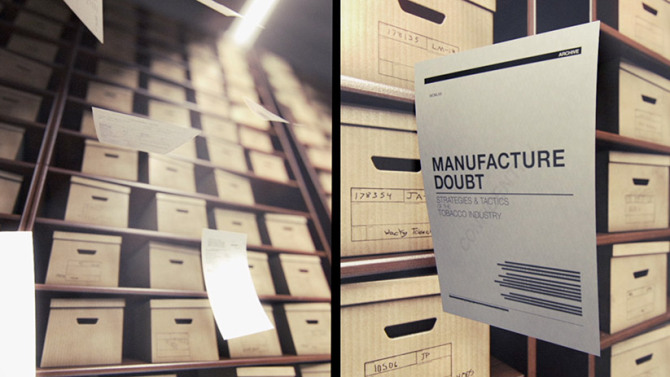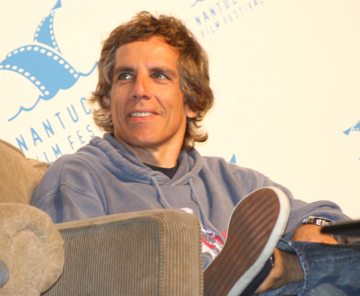|
|
||
|
Pro Tools
FILMFESTIVALS | 24/7 world wide coverageWelcome ! Enjoy the best of both worlds: Film & Festival News, exploring the best of the film festivals community. Launched in 1995, relentlessly connecting films to festivals, documenting and promoting festivals worldwide. Working on an upgrade soon. For collaboration, editorial contributions, or publicity, please send us an email here. User login |
Laura BlumLaura is a festival correspondent covering films and the festival circuit for filmfestivals.com. She also publishes on Thalo
 Filmmaker Robert Kenner Deals with "Merchants of Doubt"
What do "merchants of doubt" do? The question arises now that Robert Kenner has come out with Merchants of Doubt. Like his Oscar-nominated documentary, Food, Inc., this engrossing new exposé once again sounds a caveat emptor for American consumers, only this time the beef is purveyers of spin and the threats they pose to Earth's survival. It's hard to say who is more outrageous, the individuals who peddle skepticism about climate change or the industries that advance their deceptions. A colorful example of the former is ClimateDepot.com's Marc Morano, but there are also such ideologues as Fred Singer, who, we learn, equates official environmental policymaking with socialism. Among the bankrollers are oil companies like ExxonMobil, which both denies global warming and exploits the opportunities it has opened up for Arctic oil exploration. The media industry also comes in for a reckoning, notably for featuring agenda-mongers alongside solid scientists. In the bona fide science seat, our hearts especially go out to James Hansen. As a pioneer in global warming research, he "just assumed humanity would take sensible action." Instead, like science historian Naomi Orestes -- who co-authored the book that inspired Kenner's film -- he has not only watched his studies become vilified, he has personally come under vicious attack. No matter that Orestes found a near consensus among the world's climate scientists that man-made threats to the planet are real; the naysayers persist in claiming that scientists don't agree and that conclusive data is lacking. To place the doubt trade in historical perspective, Merchants harks back to tobacco's 50-year campaign to thwart health concerns about its product. As we learn from scientist Stanton Glantz, the tide of the battle turned when secret industry documents were leaked, showing that the tobacco firms recognized the carcinogenic hazards of cigarettes as far back as the Fifties. Yet, taking the cue from PR agency Hill & Knowlton, the tobacco makers found a way to stave off legal action and continue minting death sticks. The strategy was couched in an internal document that proposed "doubt" as the most effective "product" to challenge the "body of fact" informing public awareness. A lesser known chapter linked to tobacco's cover-ups spills into the chemical industry. As revealed by Chicago Tribune reporters Patricia Callahan and Sam Roe, the flame retardants that permeate home furniture across the country are composed of toxic compounds. What's the connection? "You have to fire-proof the world around the cigarette," explained a tobacco company memo regarding the frequent fires ignited by cigarette butts. The sector went on to plant an operative, Peter Sparber, in the National Association of State Fire Marshalls to take the heat off of cigarettes. A windfall for flame retardant manufacturers, the new push inspired the chemical industry to establish faux grass-roots fronts along the lines of Citizens for Fire Safety that hawked their cancer-causing poisons. Images of children jumping on cushions make it especially tough to imagine how anyone behind such recklessness could manage to sleep at night. Which begs the question: who are these cynical pundits and how do they live with themselves? Watching Merchants, it's hard not to think of the The Corporation. Mark Achbar and Jennifer Abbott's 2003 documentary likened the behavior of companies to that of a destructive psychopath with no conscience. Is it going too far to say that the flacks for hire featured in Merchants put faces to this very disorder? I reached Kenner for his thoughts on this and other queries kicked up by his powerful film. Q: Play head shrinker for a moment: what's going on in the minds of these spin meisters? RK: There are certainly hired guns that are out there just to help industries get what they want to help preserve their profits. But it goes beyond just the corporate greed that is given a face by these merchants of doubt. Ideological fear also gives them a cover. When the Berlin Wall fell, some top level scientists started to think that the new threat to America was no longer communism, but environmentalism or any group that wanted any form of regulation. So it was that ideological veneer mixed with the corporate greed shown in the faces of these merchants of doubt that came together to create a situation where we're now putting the planet in peril. Q: How do they square the ethics of their work? RK: Some people enjoy the attention and the publicity, and they enjoy being on camera -- so it's for their own personal reasons. And perhaps part of it is just a culture that exists in Washington, and they think they're no different from anybody else who's operating out there. Tim Phillips, who's with Americans for Prosperity and is basically handing out the Kochs' billion dollars that's coming up for the next election, said his father bought votes for the Democratic Party. He may not think he's that different. In the tobacco industry, they tried to cloak their arguments in terms of freedom, that people should be at liberty to smoke where they want. And they started using jobs arguments. Q: Is there ever a moment of reckoning when the implications of their deception hits them? RK: The tobacco guys who for 50 years were able to create doubt around a product where there was no doubt -- and they knew it better than anyone -- did a masterful job of keeping the question open. But finally a judge said they had to take out an ad saying they'd lied. We don't have 50 years with climate, but hopefully (Jim) Inhofe (R-Okla.) throwing snowballs in the Senate will start to look like a pretty dark act in the very near future. Q: Did tobacco execs believe their own lies? And how about other pundits-for-hire whom you interviewed? RK: I spoke to the Winston Man. He was upset and asked the tobacco executives whether they smoked, and they said, "No! Smoking is for poor people, Black people and stupid people -- we'd never touch the stuff." Another person I talked to is Peter Sparber. He was fighting legislation to create a slow-burning cigarette, which his company didn't want. He convinced fire departments that it wasn't cigarettes that caused house fires: it was couches! That's a brilliant operator who could get it made into law that we have to put chemicals into couches that don't prevent fires and that cause cancer so that he could continue selling a cigarette that wasn't slow burning. Peter Sparber said he could take James Hansen and a garbage man, and he could get America to believe the garbage man knows more about climate science than Hansen. That's a pretty terrifying little thought. So at some level I think he had a certain pride that he was so good at his job. Q: So are the Sparbers of the world psychopaths? RK: One might think that. Q: ClimateDepot.com's Marc Morano stands out as especially unsettling because of his ad hominem attacks. RK: When I spent time with Marc Morano, I thought he was funny and quick. But at the same time it's frightening what effect his work has on the scientists out there. On the one hand you're just charmed being with Marc. On the other hand, look what's happening to those people's lives. Q: Given today's tolerance for -- if not celebration of -- the gladiator game of character maiming, how to dampen public appetites for such nastiness? RK: One of the things that I came away thinking while making Merchants is that it was the press that let us down, because they allowed people like Marc Morano to go on television and play a scientist. That shouldn't be allowed. Q: To what extent are news producers starting to get wise to flacks masquerading as science mavens? RK: I think things are starting to change rapidly. It's not so long since people like Marc were allowed to do that, or James Taylor, who took a course or two in college and that made him an expert. They're all there to do one thing: to slow up and create doubt around whatever issue is inconvenient. As the media starts to become much more critical, people like Marc will lose their soap box. The New York Times is starting to lead the way on that. They outed climate denialist Willie Soon saying he'll write scientific papers as deliverables for oil and coal companies. But it was very different just a few years ago with them. It's important to portray people for who they really are. We need more transparency, and the media has to dig deeper to figure out whom they're listening to when they say there's a debate. Q: As we see in the film, the conservative former North Carolina congressman Bob Inglis became convinced of humanity's hand in climate change after visiting Antarctica, yet he tanked in the subsequent elections. Isn't that a deterrent? How to change voters' minds? RK: In 2008 you saw one Republican congressman or presidential candidate after another saying that climate change is the major challenge facing us. John Bonner was saying, "Of course man contributes to climate change." And six months later he says, "Oh, it's laughable to think that man contributes to climate change!" So the Kochs made great headway, and Phillips was partially responsible for switching voters and congresspeople. There was this great sense of fear that existed. But I think things have changed since then. They still have more and more money, but at the same time some of the doubt is slipping away about what's happening. I'm encouraged by polls showing that 48 percent of all Republicans think that there should be action taken on climate change. What's interesting is that the Phillips and Koches' money is still able to pursuade a number of senators and congressmen to vote against any action, but as their constituents change the money will be less effective, and politicians are going to go where the votes are. People get upset when they see the film. They get upset when they see the Willie Soon article. Q: What were your biggest challenges -- including any legal constraints -- of doing a documentary exposé like this? RK: Getting the merchants to come on camera and then getting them to be open enough to express how they see world took a lot of work. We weren't always successful, but at times we were shockingly successful. Legally, you just better make sure everything you say has three sources! I'm ready to defend every single word in our film. Q: What can a documentary like Merchants accomplish that Aaron Eckhart starrer Thank You For Smoking cannot? RK: We're trying to be a little more specific and say, "Hey, here are these people and they've gone from one product to another." And it's real. That's the difference. You're seeing them and the effect that they've had on our health and on our country. Q: What gave you the idea to bring in magician Jamy Ian Swiss? RK: Throughout the production we kept thinking, "These guys are just like magicians! They're just amazing! How do they do it?" Slowly the idea of having a magician dawned on us. And then there was (Fox News commentator and junkscience.com founder) Steve Milloy, who talked with me for months. I got on the plane with five people and flew to Washington to meet with him and then he cancelled when I arrived. There's that footage of Steve Milloy with Glenn Beck and Glenn Beck asks, "Are you in bed with big oil, and if so, how good are they?" And Steve says, "I'm just trying to do the right thing." That's our magician saying his helpers are going to look like they're independent. Jamy's talking about a three-card Monty game where they have people who are winning, to give the suckers out there the confidence that they can win too. He's talking about how to mask the shill -- how to make the shills look legitimate to the audience so they're not suspect when they're playing the game. It's all part of the psychology of the game. The game does not work without that concealment. In effect, that is exactly what we're talking about with the merchants of doubt. They need to pretend that they're independent agents when they're not: they're hired guns out there to confuse the public. But they don't say, "Hey, I'm working for Exxon," or "I'm working for Southern Company." They say, "I'm an independent person trying to do the right thing." I didn't want to make a film about climate change; I wanted to make a film about how people are being deceived and lied to, and show that the same people who worked in tobacco have gone on to take on different issues using the same arguments. They've been very successful, and if people can see that pattern, hopefully they will get angry and change things. 04.03.2015 | Laura Blum's blog Cat. : Bob Inglis climate deniers Fred Singer James Hansen magician Jamy Ian Swiss Marc Morano Merchants of Doubt Naomi Oreskes Peter Sparber pundits for hire Robert Kenner spin tobacco companies Willie Soon Independent
|
LinksThe Bulletin Board > The Bulletin Board Blog Following News Interview with EFM (Berlin) Director
Interview with IFTA Chairman (AFM)
Interview with Cannes Marche du Film Director
Filmfestivals.com dailies live coverage from > Live from India
Useful links for the indies: > Big files transfer
+ SUBSCRIBE to the weekly Newsletter DealsUser imagesAbout Laura BlumThe EditorUser contributions |





























